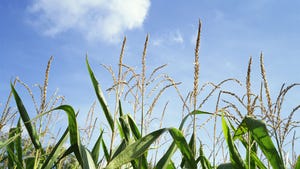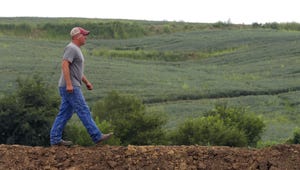Climate change could [will] hammer the Des Moines and Iowa economies in the decades ahead, as spiking temperatures dramatically reduce crop yields, increase energy costs for manufacturers and reduce worker productivity, according to a new report released Friday.
The report's grim assessment for the state, designed to look at the business risks from climate change, is similarly gloomy for other Midwest states and their largest cities, including Chicago, St. Louis, Indianapolis and Minneapolis.
Agriculture will be particularly hurt by climate change, it said, with corn, soybeans and wheat yields slashed as much as 85% by the next century in the leading farm states of Iowa, Illinois, Indiana and Missouri. Livestock also is expected to experience reduced productivity and other challenges.
READ: The full report
The study comes from the Risky Business Project, a group led by Michael Bloomberg, New York City's former mayor, former U.S. Treasurer Henry Paulson, and Tom Steyer, a former hedge fund manager-turned green political activist.
It was released just a week after the federal government said that 2014 was the warmest on Earth, breaking previous records set in 2010 and 2005, and reinforcing scientific assessments that humans are causing global warming, and the influence is growing.
The report said climate change would hit Iowa's economy the hardest among Midwestern states because of reduced crop yields. Iowa is the nation's largest grower of corn.
By the end of the century, "the state could face likely declines in its signature corn crop of 18 to 77% — a huge hit for a corn industry worth nearly $10 billion," the report said.
The farming impact would have a domino effect in Iowa because of its ties to manufacturing, insurance and other industries.
"The economic output losses from commodity crop declines in Iowa are high — likely $850 million to $12 billion per year by century's end — even though yield declines aren't as high in this state as in some others," the report said.
Greg Page, chairman of Minneapolis-based Cargill Inc., and one of the business leaders on the Risky Business advisory committee, said Thursday the report is a "wake-up call to begin having a conversation" on the impact of climate change.
"If we stand still, and fail to be thoughtful in building resilience, we could see a weather scenario that would produce an outcome that's dire," Page said. "But it's our job to make sure that isn't what happens."
One thing the report doesn't reflect, he said, is changes farmers may make to offset changes to growing conditions — through seed genetics, irrigation and other approaches.
"American farmers have enormous ability to adapt," he said.
The study echoes other assessments that have been released with increasing urgency, including from the federal government, the United Nation and environmental groups. However, the warnings have met with a cool reception from Washington and elsewhere who dispute findings the planet is warming, or that humans are responsible.
Sentiment could be shifting, slightly. As part of the Keystone XL pipeline debate, the U.S. Senate voted 98-1 for an amendment Wednesday that stated climate change "is real and is not a hoax."
But the Senate stopped short of saying humans are to blame.
Page acknowledged agriculture and business leaders have resisted climate-change assessments.
"It's mostly a fear of regulatory over-reach," said the former Cargill CEO. "That's not an unreasonable concern.
"But we have to overcome it, because of the gravity of what we do. We have to feed everybody. We have to put that angst aside and talk about this."
The Midwest assessment paints an apocalyptic picture of Des Moines and Iowa 85 years from now, suffering temperatures over 95 degrees an average of 34-89 days each year by the end of the century.
Des Moines has experienced an average of 4 days over 95 degrees each year for the past 30 years, the report said.
Rising heat will cause a range of problems, from diminished labor productivity, especially for farmers, builders and others who work outside, to reduced water quality and increased heat-related deaths and violent crimes, the report says.
Iowa, the report said, "has the highest overall economic burden due to changes in labor productivity of any state in the Midwest region, possibly because of the large percent of workers in the region — nearly 40% — who work in outdoor industries."









No comments:
Post a Comment